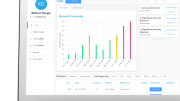We talk to Robert Nieves, VP of Health Informatics for Clinical Solutions at Elsevier, about the role that digital transformation is having on nursing, and the ways that innovations are helping to improve patient safety and clinical outcomes.
How has the healthcare landscape changed, particularly for nurses, after the global COVID-19 pandemic?
The COVID-19 pandemic has impacted all aspects of clinical practice, compelling professionals to take on numerous challenges in record time and rethink many of their usual processes. It has resulted in the rapid adoption of digital technologies, significant changes in care delivery, and provided important lessons that will define how clinical care is delivered by interdisciplinary healthcare teams.
Following on from the recent health crisis, healthcare organisations have realized that they have to use everything they’ve learned to improve the way they work, mitigate errors, redirect the care provided to patients and focus on achieving a safer patient world.
What specific areas of healthcare do you think have changed the most?
Big data and digital health, an increasingly empowered patient population, and the implementation of a blended clinical environment.
Elsevier Health recently published the Clinician of the Future report, which helps identify the changing needs and evolving roles from the perspective of healthcare professionals. The data also highlights the necessary tools that will develop and respond to a new healthcare model and define the role of nursing and their leadership in the changing healthcare digital transformation landscape.
Among the most notable conclusions of this research, a large majority of clinicians (71%) also recognize that their roles have changed in the last decade. There is an expectation that their roles will continue to evolve throughout the next decade, with clinicians highlighting the importance of acquiring “Technology Intelligence.”
How are nurses important in the implementation of technology during post-pandemic care?
The Clinician of the Future report shows 80% of clinicians believe that big data will be an integral part of population health management, and 70% agreed that the general use of digital health technologies will enable a positive transformation of care. The innovations that are expected to be developed include the continued adoption and optimization of electronic medical records (EMR) with the integration of multiple data sources; increasingly personalized treatment approaches, in which the analysis of clinical data in real-time will be key; and the use of artificial intelligence (AI) tools for Clinical Decision Support.
The role of technology in empowering nurses is critical. With personalized care at the forefront, nurses are the professionals who spend the most time with patients, getting to know their individual preferences and using the information to treat them holistically. Nurses must fully understand the importance of capturing this type of patient information and making it actionable. They must also consider documentation as a valuable source of high-quality data, which has a direct impact on real-time analytics and clinical decision-making. However, for patient knowledge to have an impact, the clinical decision support tools must be adopted and incorporated into many of the daily processes that nurses carry out. Knowledge must be actionable to truly make a difference.
As healthcare is moving into a digital-first era, do you think nurses are already sufficiently trained to readily incorporate new health technologies into their daily processes?
The transition from the traditional healthcare model to a digital model has two needs that must be addressed: digital literacy, and the transformation of the interdisciplinary team.
Education that is focused on keeping clinicians aligned to the latest digital health technologies, data and data security will be key, however, it must go beyond the ‘point, click and fill out the field’ training. Clinical profiles, roles and teams will change, as skills needed to use technological innovations will be required.
The support of larger and better-equipped teams will also be needed to manage data and information technology properly. Everything indicates that interdisciplinary teams will be expanded to include analysts, data scientists, and experts in data security.
Why should nurses assume a leadership role in digital transformation, and what are the key characteristics of nursing leaders?
Fundamentally, every nurse must now assume the role of a leader, and every healthcare organization should foster a culture to empower nurse leaders. Due to the nature of COVID-19, the world has come to realize that nursing plays a pivotal role in the care and well-being of our patients. For us to achieve a safer patient world, we need nurses to actively participate and lead in this effort.
Being a nursing leader means assuming important responsibilities, such as keeping up to date with the latest health research. On top of this, it means providing evidence-based care, supporting the team with the knowledge and tools necessary to deliver the highest quality of care, developing treatment plans to improve care and outcomes, as well as educating patients to help them empower themselves.
Importantly, healthcare organizations must promote and develop leadership qualities for all members of nursing teams. These attributes include the ability to communicate and motivate staff, think creatively and critically, innovate with new workflows, delegate tasks, and advise and teach others. Assuming those responsibilities and strengthening those characteristics is what will lead us to a sustained transformation.
How can leadership be put into practice to achieve the vision of a safer patient world?
The answer comes from two key strategies, nursing informatics and the implementation of new standardized care models based on best practices.
Informatics in nursing is a newer discipline that focuses on the use of data, derived from the care provided, to deliver information within context, and apply that knowledge through clinical reasoning and decision making. These actions are carried out via structures, processes and information technologies to provide support to nurses, interdisciplinary allied health team members, and patients. This discipline implies the appearance of new roles and offers important opportunities for the nursing profession.
The other strategy, which allows nursing to conduct digital transformation through its leadership role, is the incorporation of the latest clinical evidence into care models. Clinicians tell us that they are not ready and need more knowledge, education, and training – the solution lies in developing and defining new models and applying them.
Evidence-based practice is the starting point. Followed by the adoption of the model by all the clinicians involved in the process, capturing and analyzing patient data, producing empirical results, and, in turn, providing either new evidence or validating the existing practices.





